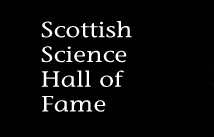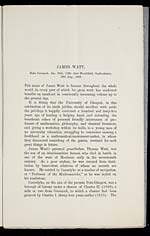James Watt (1736-1819)
James Watt: An oration delivered in the University of Glasgow on the commemoration of its ninth jubilee. An oration by Lord Kelvin
JAMES WATT,
Born Greenock, Jan. 19th, 1736; died Heathfield, Staffordshire,
19th Aug., 1819.
THE name of James Watt is famous throughout the whole
world, in every part of which his great work has conferred
benefits on mankind in continually increasing volume up to
the present day.
It is fitting that the University of Glasgow, in this
celebration of its ninth jubilee, should recollect with pride
the privilege it happily exercised a hundred and forty-five
years ago of lending a helping hand, and extending the
beneficent solace of personal friendly intercourse of pro-
fessors of mathematics, philosophy, and classical literature,
and giving a workshop within its walls, to a young man of
no university education, struggling to commence earning a
livelihood as a mathematical-instrument-maker, in whom
they discovered something of the genius, destined for such
great things in future.
James Watt’s paternal grandfather, Thomas Watt, was
the son of an Aberdeenshire farmer, who died in battle in
one of the wars of Montrose early in the seventeenth
century. As a poor orphan, he was rescued from desti-
tution by benevolent relatives of whom no records are
known. He settled in Carsedyke as a teacher of navigation,
or “ Professor of the Mathematicks,” as he was styled on
his tombstone.
Carsedyke, on the site of the present Port-Glasgow, was a
borough of barony under a charter of Charles II. (1669), a
mile or two from Greenock, to which a charter had been
granted by Charles I. thirty-four years earlier (1635). The


